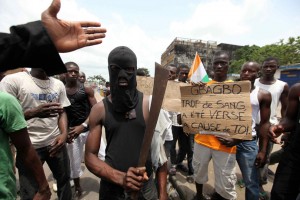By Tara Pistorese
Impunity Watch Reporter, Africa
YAMOUSSOUKRO, Cote D’Ivoire—Former Ivorian President Laurent Gbagbo’s failure to admit defeat during the 2010 presidential elections gave rise to months of controversy, fighting, displacement, and death. Following the post-election tumult, an eleven-member Commission on Dialogue, Truth and Reconciliation (CDVR) was formed in an effort to promote unity and healing throughout the country.

The Commission—comprised of religious leaders, regional representatives, and soccer star Didier Drogba—is modeled after South Africa’s Truth and Reconciliation Commission, which was passed in 1995 as the Promotion of National Unity and Reconciliation Act.
Aiming to uncover the truth behind the post-election tragedies of 2010-11, CDVR members have begun organizing confrontations between victims and those accused of committing atrocities. Notably, however, unlike the South African Commission, CDVR will not afford amnesty to those who confess to committing such crimes.
“We need to know the truth, even if it’s not pretty,” said Charles Konan Banny, a long-time ally of President Alassane Outtara and head of CDVR.
Sadly, however, halfway through its two-year mandate, the Commission faces a stifling lack of funding, which is evidenced by its very slow and seemingly unnoticeable progress, although CDVR Spokesman Franck Kouassi Sran believes it inaccurate to declare the Commission has had no impact.
“If we haven’t deployed all of our actions, it’s because we’re being held back by a lack of resources,” he said. “We hope that soon we can restart our activities to do everything necessary to complete our mission.”
The Ivorian government claims reconciliation is a priority, and has focused much of its recent attention on prosecuting Gbagbo’s supporters and those responsible for the crimes committed during the conflict.
Gbagbo, however, is still awaiting trial at The Hague for charges of crimes against humanity for murder, persecution, rape, and sexual violence that allegedly occurred at his hand during the post-election period.
The initial hearings were scheduled to take place in June; however, per defense counsel’s request for additional time in order to prepare, the hearing was rescheduled for August 13.
But, yet again, the hearing has been postponed to determine whether Gbagbo is healthy enough to stand trial. Defense counsel has consistently maintained Gbagbo was “tortured” during his detention in Korhogo. The attorneys claim their client needs time for psychological and physical recovery.
Although the Court offered no specific information on the state of Gbagbo’s health, it issued a statement announcing that Gbagbo’s attorneys appointed three doctors to assess the detainee’s health. The physicians filed confidential medical reports in July and the pre-trial chamber has ordered “the prosecutor and the defense to submit their observations on (medical) reports, respectively, by 13 and 21 August.”
For further information, please see:
BBC News—Ivory Coast Truth Commission ‘Not Working’—3 August 2012
Capital FM News—ICC Puts Off Gbagbo Hearing Over Health Fears—3 August 2012
Reuters—Hague Hearing for Ivory Coast’s Gbagbo Postponed—3 August 2012
The Hague Justice Portal—Trial of Suspected Génocidaire Begins at ITCR—28 September 2011